

Overview Humanity 10.0
The overview of Humanity 10.0 is only an introduction.
Details can be found in the book, under information on Humanity 10.0 and Q&A.
Why Humanity 10.0?
Too many existential questions - too few real answers!
We are facing great challenges, e.g.:
- climate change and environmental degradation
- dealing with finite resources
- too much uncertain and false information
- tensions in societies
- conflicts between social systems.
There are various approaches to solutions, but these
- are mostly concentrated on single focal points
- are predominantly short- and medium-term oriented and
- are not sustainably integrated into an overall concept.
We humans currently lack:
- common visions and goals,
- the implementation of positive values, and
- the will to solve global problems.
Further reasons also result from advantages of Humanity 10.0 .
Humanity 10.0 - Wishes and Visions
Shaping the future together and consciously through:
- opportunities for everyone to be able to participate
- collecting and systematising ideas, and
- jointly developing optimal concepts.
Visions for all people are:
- ensuring the survival of humanity,
- developing societies, and
- increasing people's satisfaction.
Further wishes and visions can be found in the book.
Humanity 10.0 - Ideas and Goals
The goals of Humanity 10.0 include
- connecting people more strongly with each other,
- pointing out and resolving contradictions, and
- supporting the solution of current problems.
Create supportive framework conditions such as:
- applying a fact-based objective approach,
- establishing thinking in the "original state", and
- proceeding systematically in a holistic manner.
Further goals and ideas can be found in the book.
Humanity 10.0 - Concepts and Priorities
The core of Humanity 10.0 is the new universal values/rating system.
The values and evaluation criteria are derived from the areas of focus that are important to us.
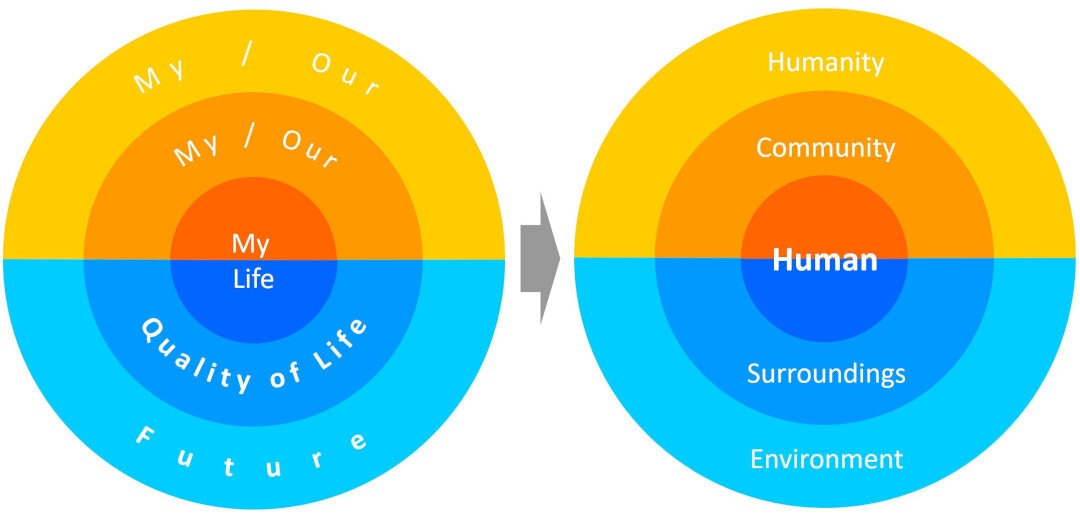
The human being is the centre of attention, but is directly dependent on
- the material means of subsistence in his or her close surroundings,
- the sense of belonging and the division of labour in the community,
- the preservation of the environment as the long-term basis of life,
- the common values of humanity to safeguard the "species".
Five simple questions create clarity.
Is an issue or trend and its developments positive or negative for:
- The individual Human (you/me)?
- My/our close Surroundings?
- My/our Community?
- The entire Environment?
- Humanity as a whole?
These questions are posed, both for the current situation and for the likely medium and long-term development. Sustainability and securing the future are gaining in importance.
The values / rating system is universal and neither the evaluation priorities nor the evaluation order are predetermined. The importance of the issues / ideas as well as the priorities also results from the feedback on wishes / visions, ideas / goals and concepts / priorities.
Issues to be evaluated can be, for example:
- products and services
- solutions from all areas
- declarations of intent, statutes, political party programmes
- social contexts
- trends and developments
- people's actions.
Even thinking about the facts themselves leads to useful insights and initial ideas for improvements.
The first step in applying the values/rating system is to make a rough assessment of whether the issue or idea is currently positive or negative.
If possible, forecasts for the future should also be included.
Through these initial qualitative assessments, it becomes clear which issues / ideas are generally positive or negative.
In this step, it should also be assessed what significance the issues / ideas have for us humans and will acquire in the future.
In a second step, the important facts and ideas are examined more closely. Meaningful evaluation levels must be determined in order to be able to make a quantitative evaluation. This is followed by an assessment of how positive or negative the issues / ideas currently are.
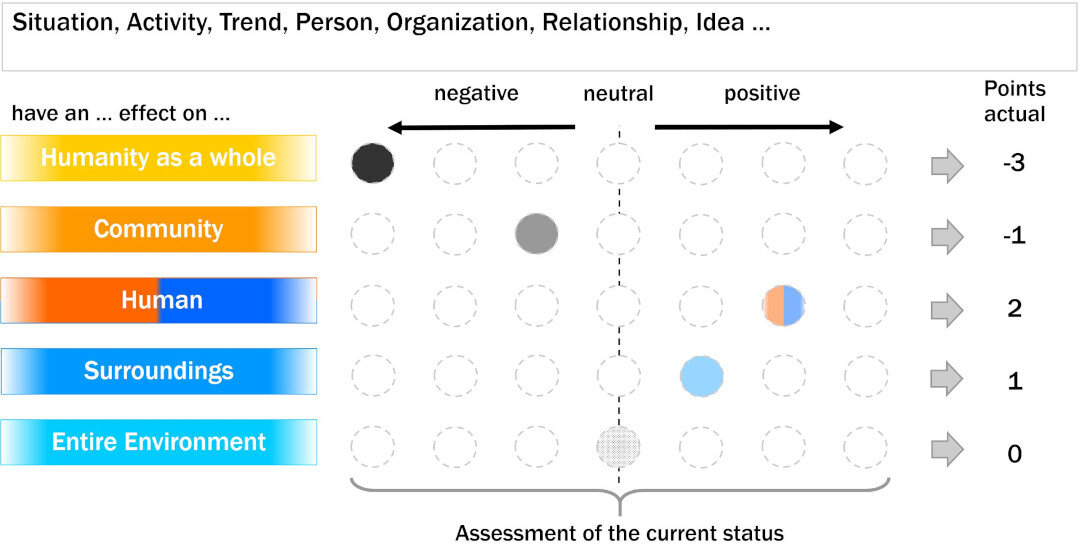
If possible, projections for the future should also be quantified.
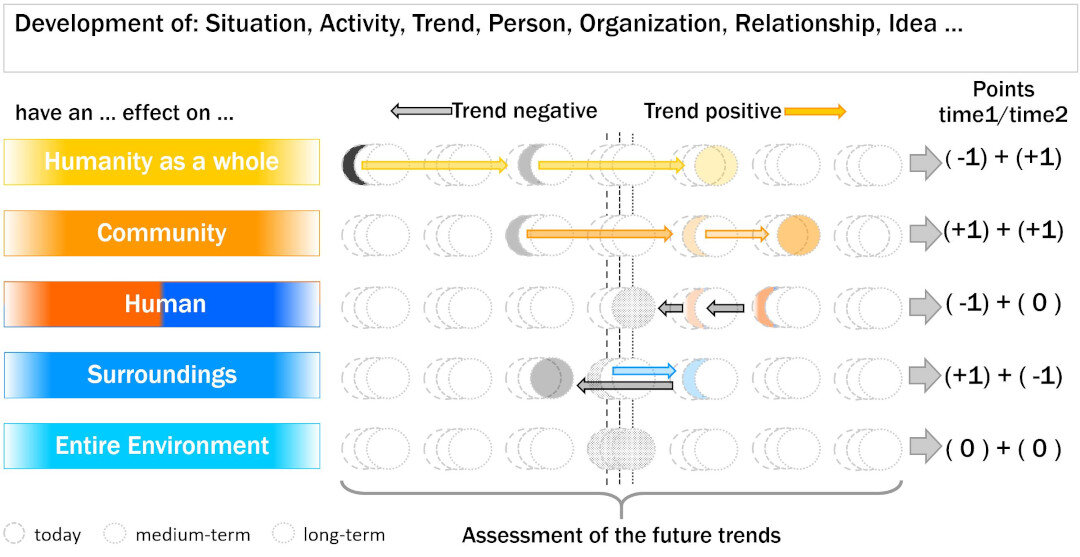
The issues / ideas themselves as well as their evaluation for the points in time, present and future are of varying importance. In order to take this into account, several factors are introduced.
Additional factors for coordination and adjustment can be useful, e.g. for quantitative coordination of the evaluations among each other.
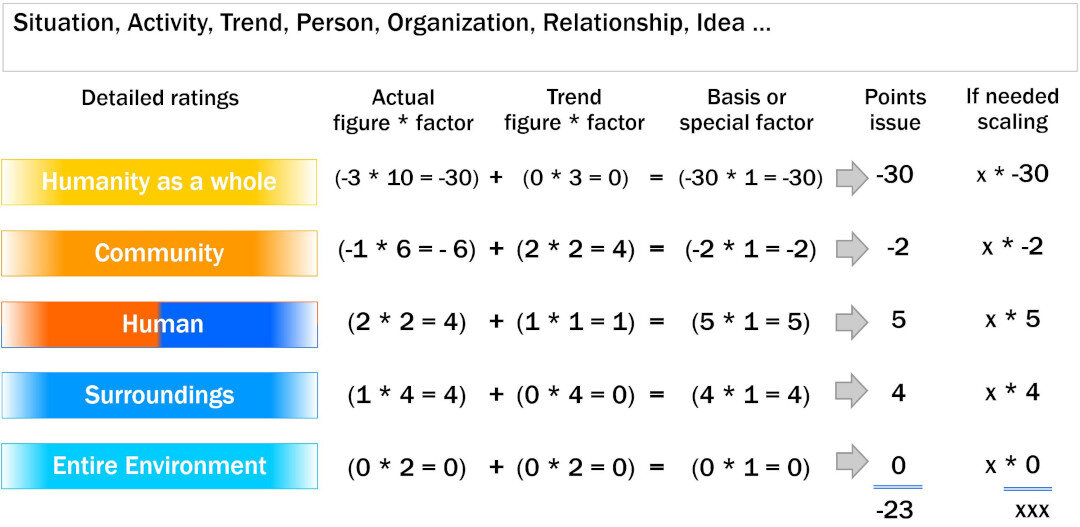
The ultimate goal is that an issue / an idea, as well as the developments have a qualitative assessment of how positive or negative they are for us overall. The adjusted evaluations result in an evaluation number for the issue / idea and the developments, the “Humanity Points". For example, if an issue receives a lot of “Humanity Points", it is very important and very positive for us.
A detailed description of how a quantification can be carried out as an example can be found in Appendix 1 of the book "Humanity 10.0 - Shaping our future together".
After “Humanity Points" have been determined for the issues / ideas and developments, these can be used further. Different issues can now be compared with each other and a better focus on the issues that are important for us is possible.
If the number of “Humanity Points" is increased through targeted measures, this is a direct measure of progress. We have enough experience with values/rating systems and under which circumstances people and organisations adopt them.
Which issues are important to us, how we want to live in the future, where Humanity 10.0 should develop, all this can be influenced by everyone through their feedback on this website.
The best arguments for a new approach and the development of a new values/rating system are the resulting advantages. For example, the concept of Humanity 10.0 and the fact-based objective value/rating system offer the following advantages:
- A positive vision for all people is created
- Everyone can help shape the future
- The understanding of interrelationships is promoted
- The values/rating system is universal and flexible.
- Transparent values/rating criteria are created.
- Equal opportunities for all people are improved
- Problems are solved faster and better
- Positive developments are promoted
- Crises can be avoided.
Examples of how the values/rating system of "Humanity 10.0" works and what advantages it brings for specific people and organizations can be found in the book.

Humanity 10.0 - Introduction and Monitoring
With many good ideas, too little attention is paid to implementation, especially roll-out. A concept for the implementation of Humanity 10.0 is available. Value was placed on openness, flexibility and widespread involvement of all.
For Humanity 10.0, framework conditions are named under which implementation is also supported, e.g.:
- consistently observe objective reality
- use the "original position" way of thinking
- take different ways of thinking into account.
If these framework conditions cannot be created, the introduction of Humanity 10.0 is nevertheless possible. This is especially because Humanity 10.0 can be introduced in parallel to everything that exists, in individual steps adapted to the given conditions. Our collective knowledge and the necessary tools are already available.
Since the evaluations in the values/rating system concentrate on facts, a reference to persons / organizations is not absolutely necessary. Persons / organizations are thus not "attacked" and a consensus can be found more easily.
The introduction of Humanity 10.0 is flexible both in terms of time and scope. It can be started with qualitative assessments to quickly get a good overview of facts. Quantitative assessments of individual, well-known issues are also useful in order to gain experience with quantification in the values/rating system.
In order for Humanity 10.0 to be introduced and for qualified assessments to be carried out, people and organizations must be interested in Humanity 10.0. This interest is to be aroused by specifically addressing persons and organizations.
Linking the values/rating system to persons and organisations is not mandatory, but has considerable advantages. For example, it becomes transparent which persons or organisations are involved in finding solutions and which are not.
The actions of persons / organisations shape societies. If persons/organisations are motivated by “Humanity Points" to generate social progress, this benefits everyone. For the introduction and application of the “Humanity Points" it is important that existing values/rating systems are not questioned. Humanity 10.0 wants to give clues as to what is positive for us humans - which values promote this. For example, money and property will not be abolished. However, the aim is to create the greatest possible added value for society through the sensible use of money and “Humanity Points".
The organisation of the introduction and the establishment of control mechanisms should also focus on the greatest possible benefit. Since all persons and organisations can participate in the development of the values/rating system, the introduction and control can take place via existing social structures. However, an independent body or neutral processes for the necessary controls would be beneficial.
Even if the application of a global values/rating system in all societies on earth would bring the greatest positive effects, e.g. in solving current global problems, any form of introduction of the Humanity 10.0 values/rating system is worthwhile. An initial estimate of the steps at which positive effects can be expected is shown in the following graphic.
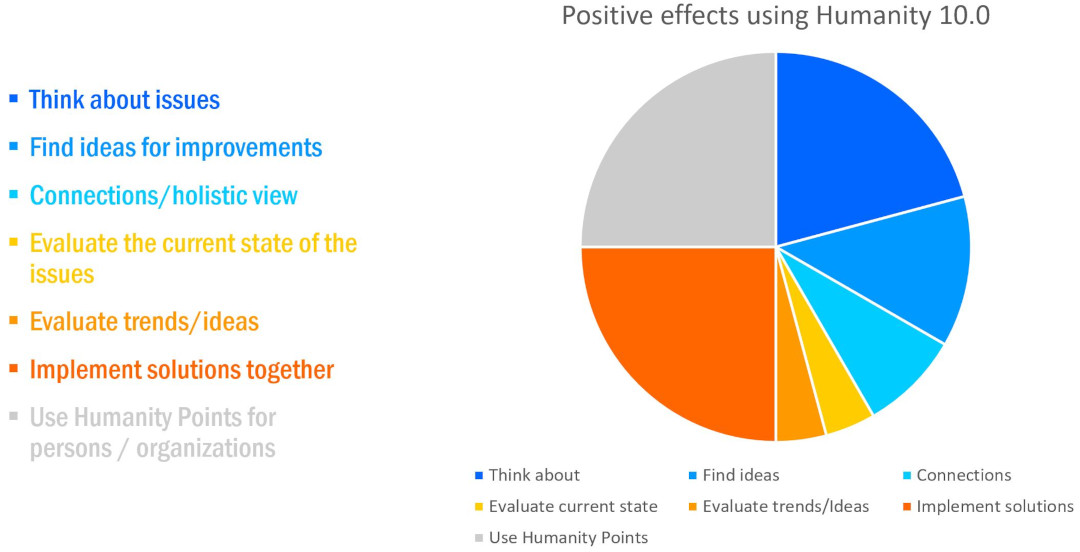
To summarise, here are some advantages of the concept for the introduction of Humanity 10.0:
- Humanity 10.0 is free of "legacy" and dependencies.
- Nothing is abolished, there are additional opportunities
- The possibility of co-design reduces resistance
- The introduction can be flexibly adapted to the circumstances.
Details and suggestions not only for the introduction and control of Humanity 10.0 can be found in the book.
Questions, Ideas, Comments
If you miss something important in the overview of Humanity 10.0 or have questions that were not answered in the Questions and Answers, please feel free to send us a message here.
